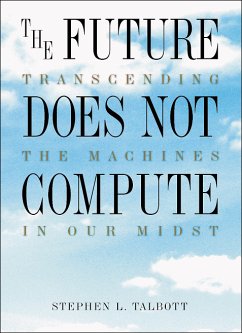Many pundits tell you that the computer is ushering us toward a new Golden Age of Information. A few tell you that the computer is destroying everything worthwhile in our culture. But almost no one tells you what Stephen L. Talbott shows in this surprising book: the intelligent machine gathers its menacing powers from hidden places within you and me. It does so, that is, as long as we gaze into our screens and tap on our keyboards while less than fully conscious of the subtle influences passing through the interface. Talbott awakens us to these influences by conducting a wide-ranging tour: Why do we hail the birth of the electronic global village just as villagers around the world are killing each other? Is the Net an instrument for social dissolution? Do the Renaissance origins of virtual reality throw light on our world-creating and world-destroying choices today? Does reality have a future? Were the barriers to creation of thinking machines clarified by a little-known philologist investigating the mythic consciousness of the ancients? Does the computer centralize or decentralize structures of power? Or does this question miss the point, because intelligent machines that run by themselves are creating a new global totalitarianism without a despotic center ? Is the frantic urging to put schoolchildren on the Internet any more reasoned than the seventies' fad for programmed instruction, or the eighties' fad for computer literacy? Does an unrecognized law link the public face and the dark underside of the Net? If so, can we expect flame wars, weird impersonations, pornographic commerce, and Net psychoses to grow increasingly pronounced and erratic, while at the same time the reasoned mechanisms for filtering "strict business" from the chaos steadily gain in effectiveness? Is artificial intelligence raising machines to a human level, or are we descending to the machine's level? After reading The Future Does Not Compute, you will never again be able to sit in front of your computer with quite the same glazed stare

